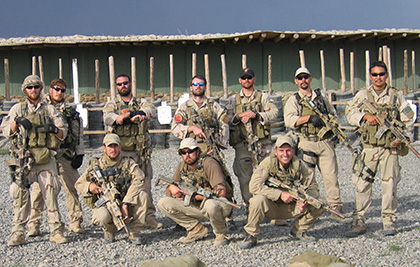
How to Walk Through Hell and Survive
A scary but inescapable fact of life is that like many people, you will quite likely be called upon to walk through your own living hell at some time or another in your life.
It could be something like the death or illness of a loved one, your own illness, a personal crisis, an abusive or violent situation, or who knows, maybe even something far scarier or more sinister.
Unfortunately, bad stuff happens.

It may last only for minutes, or it may last for years, but it happens.
Each and every day people are forced to face crises that leave them, and even onlookers, wondering how they can possibly manage to get through it.
More often than not, they do.
But not always. Because we all have that ever-present option of quitting. Of giving up when the going gets too tough. Sometimes that’s the easiest solution.
What exactly am I talking about when I refer to quitting, or giving up? Well, here are some examples:
- Taking your own life.
- Laying down and refusing to continue fighting for your life.
- Failing to support a loved one through their personal hell because of the pain of seeing them in pain.
- Refusing to continue fighting and working for your own health, wellbeing and future because it’s “too hard”.
- Refusing to extract yourself from a horrible situation because the fear of an unknown future is too great.
I know these examples are a little general. But put them into context with any given personal crisis that you care to think of, and you’ll find that at least one of them will be specifically meaningful.
There’s a simple phrase that encompasses all of these examples, as well as any other failure to make it through your own personal hell, and that’s accepting defeat.
Defeat is a state of mind. You are defeated only when you accept defeat, and assume the hopeless mindset of a defeated person.
Accepting defeat is easy.
Why?
Because fear is a very powerful thing. As is hopelessness.
When you’re confronted by a crippling fear, or in a situation that appears hopeless, accepting defeat can be so tempting. It offers an easy way out of any more immediate pain and worry. That can be something that’s tough to pass up.

It’s human nature to want to focus on what we want now, and disregard what’s best in the long run.
This is particularly evident in young children. Give any young child the choice of having one sweet right now or five sweets next week, and she’ll choose the one sweet now, every time. But adults aren’t necessarily so different. That’s why they smoke, or over-eat, or lie in the sun tanning their skin, or spend their money irresponsibly, all with little regard for the future implications.
As you can imagine, then, when going through your own personal hell, your instincts can often be to call time out. To just put a stop to the pain, any way you can.
That’s what you want now.
But what of the future? What of the greater good?
It takes a lot of strength, character and courage to agree to endure the terrible pain of a personal hell, for however long it takes, simply because it’s the right thing to do. Because your life and your well-being, or those of someone else, are worth it.
The truth of the matter is that you always know the right thing to do. The hard part is doing it.
So how do you do that?
How do you best confront your own personal hell to maximise your chances of surviving to live another day? Or at least to achieve the best possible outcome?
Lone Survivor
Probably the best example of this that I’ve come across is illustrated in the real-life story of Operation Red Wings by US Navy SEAL forces, chronicled in the book Lone Survivor and in the movie of the same name.
During Operation Red Wings a team of four US Navy SEALs were ambushed in the mountains of Afghanistan by a heavily-armed enemy Taliban force, estimated to have been over one hundred in number. The result was a torrid three-hour gunfight that saw the SEAL team having to repeatedly hurl themselves over sheer cliffs down the mountain, sustaining horrific injuries, as their enemy advanced upon them. By the end, scores of the enemy forces had been shot dead, as had three of the SEAL team.

The sole surviving Navy SEAL, Marcus Luttrell, then spent the night alone trying to evade capture. He had been knocked unconscious several times, had broken his back, been shot in the back twice, sustained multiple fractures and numerous shrapnel wounds all over his body, and had even bitten his tongue in half. Despite his condition, he continued to engage the enemy in firefights and elude them.
Finally, with all his supplies, medical equipment, helmet, gear, and even part of his clothing lost, and paralysed from the chest down, Luttrell crawled for miles through the night before finally finding a waterfall and coming across some Afghan villagers who ultimately rescued him.
It’s a truly incredible story of overcoming impossible odds and of never giving up. Of never entertaining the thought of accepting defeat for a second. These four warriors endured a living hell but faced it bravely and overcame it.
Now, I know what you’re thinking. Three of them died. So in fact, they actually didn’t overcome it. Right?
Well, yes, three of them did die. But I’ll get to that a bit later on.
For now, let’s focus on how you can successfully face your own personal hell, using their example. There are three key points.
Stay in your three-foot world
First of all, you need to stay in your three-foot world.
What the hell does that mean? Well, I wrote a blog post all about it last year. You can check it out by clicking on the link below:
How to Overcome Any Challenge or Obstacle in Your Life
In fact, I strongly suggest you take the time to read through it right now before going on.
Staying in your three-foot world means focusing only on that which you can influence. Anything you can’t change or affect, you shouldn’t think about. It can’t possibly help you in any way. In fact, it can really only hurt you.

The four SEALs from Operation Red Wings never for one moment stopped to complain or even think about the seemingly insurmountable task ahead of them. Of just staying alive.
Four men against one hundred plus are very slim odds. But what good would it have done them to stop and think about that? Would it have helped matters?
Not one iota. If anything, it would only have weakened their resolve.
In an interview, Marcus Luttrell mentioned that there was no fear, no panic, and no hopelessness felt by any member of the team at any time during their ordeal. They all acted completely professionally, focused only what needed to be done, and did it.
Right to the very end, each and every one of the team fought and refused to accept defeat.
The eagle has no fear of adversity. We need to be like the eagle and have a fearless spirit of a conqueror!
Now of course, that’s easier said than done.
How do you stare death or disaster in the face and yet keep on fighting with total disregard for it?
By staying in your three-foot world, that’s how. If it’s not going to help you, don’t think about it.
To stop and dwell upon your situation, to feel sorry for yourself or angry about your situation, or to consider the likely unthinkable outcome, is to invite fear into your heart.
And once that happens, it will cripple you and you’re done.
How to eat an elephant
The second key to surviving your personal hell is to break it down into pieces that you can deal with individually.
There’s a children’s joke you may have heard before – How do you eat an elephant? One bite at a time!
Pretty silly, right? But at the same time it’s oddly profound.

Breaking down a huge task or ordeal into smaller, manageable pieces makes it far more achievable, both physically and mentally.
Part of the US Navy SEAL training program, which is considered one of the toughest and most challenging military programs in the world, is an ordeal aptly named Hell Week. It consists of five and a half days of unrelenting physical and mental challenges and sleep deprivation, aimed at pushing candidates to their very limits.
The drop-out rate among candidates undergoing Hell Week is very high. Some even quit within the first few hours, obviously defeated by the thought of having to endure another five and a half days of the same brutal punishment.
Of course, thinking about the ordeal in its entirety is enough to crush anyone’s resolve to go on. This is why a common approach to Hell Week is to simply focus on making it to the next meal time, and not worrying about what will happen beyond that.
Thinking beyond the immediate milestone is simply self-defeating.
Similarly, when undergoing a protracted personal hell of your own, just focusing on making it through each day can be a very empowering mental strategy. Don’t think about tomorrow, or the next day. Or how far you have to go.
Even if it’s years.
Just take it one bite at a time.
Whoever wants to reach a distant goal must take small steps.
During Operation Red Wings, Marcus Luttrell managed to crawl to safety following the gunfight despite his extensive injuries, by taking it one tiny step at a time.
Here’s how he recounted the experience in his own words:
I wasn’t dead, so I wasn’t just going to lay there. I had to get out of there, keep fighting. That’s what I did, I just started crawling out of there. And then they’d find me, and we’d get into a fight, and I won, and I’d just keep crawling. I’d fall down these mountainsides and whatnot and get back up, crawl back up the other side.
I’d been shot in the back, for the second time, and I rolled down this hill, and everything was pretty much gone from the chest down. But my arms still worked, so . . .
It was after I’d been shot and engaged these three guys who had engaged me, and after I’d eliminated that threat, I didn’t know what to do so I grabbed a rock and I reached out as far as I could and I drew a line in the sand. I was like, I’m gonna crawl to that until my feet hit it, and if I’m still alive I’m gonna do it again. That’s what I did. I did that for seven miles, that’s when I finally got to water, found that waterfall, down on the side of this mountain.

Imagine crawling with your hands for seven miles through mountainous terrain, whilst paralysed from the chest down. And being pursued by an armed enemy force hell-bent on killing you!
That’s a super-human achievement. But made possible by breaking the challenge down into tiny, manageable steps.
Once rescued by the Afghan villagers, Marcus was actually subsequently commandeered by the Taliban, who had him in their custody for about nine harrowing hours. Although he doesn’t talk specifically about what he endured during that time, one can only imagine that it was far from pleasant.
Nevertheless, he survived that living hell as well.
Marcus describes how he gets through these types of ordeals by breaking them down into pieces:
When things are tough I break them up into hour increments and just worry about one hour at a time. Because there is nothing that you can do to me inside an hour that is going to break me.
When you break something overwhelming down into small pieces it loses its imposing aura, and literally nothing becomes too big to take on.
Serve a purpose
Thirdly and finally, you’re only going to walk through hell and survive if you have a good reason driving you to do so.
Most often, that reason is going to be that your life and well-being, or that of a loved one, is worth it.

Even if you’re in a situation that has stripped you of your self-esteem and sense of self-worth, there are always loved ones that are ready to remind you that you do matter and you are worth saving. Think about the pain they would be put through to see you giving up, and use that to motivate you further.
Remember that for any person, navigating through a dire crisis is almost always a team effort. You’re never really fighting alone and only for yourself, but with and for others too.
As strong as their sense of self-preservation may be, any Navy SEAL will attest to the fact that what spurs them on in battle, and prevents them from ever giving up the fight, is their desire to protect their beloved brothers fighting alongside them.
Surviving hell
I don’t believe it’s possible to survive your own personal hell without incorporating all of the above three keys.
For example, you may have the strongest reason in the world for not wanting to give up, but if you let your mind waver and defeat itself, or if you let the magnitude of the situation overwhelm you, then the fear and hopelessness that you let in have the power to potentially cripple you into submission.
Almost always, the fear and worry that a situation cause is actually more painful and disabling than enduring the situation itself.
Your mind is a powerful thing. And unfortunately, if not used right it has the power to turn into your worst enemy and defeat you.
By being aware of that ever-present threat, and concentrating on keeping your mindset strong and focused, you stand the highest possible chance of surviving your ordeal.
No matter how much it hurts, how dark it gets, or how far you fall, you are never out of the fight.
Earlier on I mentioned that the four warriors involved in Operation Red Wings survived their ordeal, despite the fact that three of them were actually killed. (Out of respect for the fallen I’ll name them – Lt. Michael P. Murphy, SO2 Matthew Axelson and SO2 Danny Dietz).

Doesn’t make sense, right?
Well, here’s the thing. None of us can control everything that happens to us in our life. We can be the strongest, most positive, most determined and healthiest person in the world, but we’re all going to die one day regardless.
That’s simply beyond our control. When our time is up, that’s it.
So to die is not necessarily to fail.
And to survive a personal hell doesn’t necessarily mean to survive it in the physical sense. It means to fight through it to the bitter end, to the best of your ability. With strength, courage and dignity.
If that’s how you face your own personal hell, and you refuse to accept defeat, then regardless of the physical outcome, you’ve survived. You did the very best you possibly could. The rest is in the hands of the gods, so to speak.
Always remember that even if your personal hell does end up taking your life, the way in which you faced it lives on after you.
It inspires and empowers those you leave behind. It serves as a powerful example of how they can live their lives. And it brightens their memory of you that lives on with them.








Kymani Vincent
Posted at 20:01h, 15 OctoberThank you for the awesome content, it’s always appreciated
Gloria
Posted at 18:32h, 18 OctoberThanks very much!!